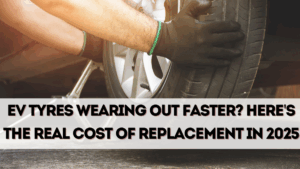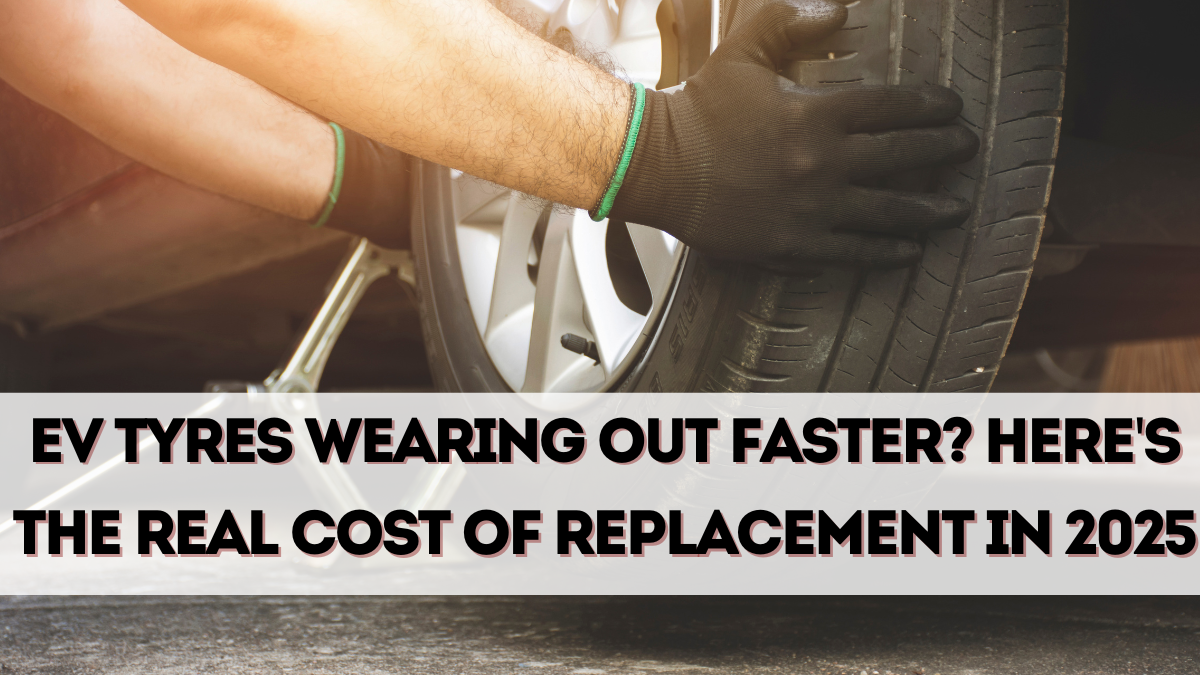Electric vehicles are gaining popularity in India, but one hidden cost is worrying owners in 2025—tyre replacement. Industry experts confirm that EV tyres wear out faster than those of petrol or diesel cars, leading to higher maintenance expenses.
As more buyers switch to electric mobility, understanding the EV tyre replacement cost 2025 is essential for planning long-term ownership.

Why EV Tyres Wear Out Faster
EVs have different driving dynamics compared to conventional cars. Their tyres face greater stress for several reasons.
-
Instant Torque: Electric cars deliver power immediately, putting more pressure on tyres during acceleration.
-
Heavier Weight: Batteries make EVs heavier, increasing road friction and tyre wear.
-
Regenerative Braking: While it improves efficiency, frequent braking also strains tyres unevenly.
-
Low Noise Demand: EV tyres are designed for quiet rides, which often means softer rubber that wears faster.
These factors combined reduce tyre lifespan by 20–30% compared to ICE vehicles.
Average Tyre Life of EVs in India
For a typical petrol or diesel car, tyres last 40,000–50,000 km under normal conditions.
In comparison, EV tyres often need replacement after 25,000–35,000 km. For heavy-use vehicles like electric taxis or fleet cars, this can be even lower.
Owners are realizing that tyre costs form a significant part of overall EV maintenance in 2025.
The Cost of Replacing EV Tyres
Replacing EV tyres is more expensive than regular ones. Prices vary based on the brand, size, and type of tyre.
-
Small EVs (e.g., Tata Tiago EV): Replacement costs start around ₹20,000 for a set of four tyres.
-
Mid-range EVs (e.g., Nexon EV, MG ZS EV): A new set can cost between ₹35,000 and ₹50,000.
-
Premium EVs (e.g., Hyundai Ioniq 5, Kia EV6): Tyre costs may reach ₹70,000–₹90,000 for a full set.
-
Luxury EVs (e.g., BMW iX, Mercedes EQ): Owners may spend well above ₹1,00,000 on a replacement set.
On average, EV owners in India are spending 25–40% more on tyres compared to ICE vehicle owners.
Brands Offering EV-Specific Tyres
Recognizing this demand, tyre manufacturers have introduced EV-specific products in 2025.
-
MRF and Apollo: Offering affordable EV tyres tailored for compact models.
-
Michelin and Bridgestone: Supplying high-performance tyres for mid-range and premium EVs.
-
Continental and Pirelli: Focusing on luxury EVs with long-lasting, low-noise designs.
These tyres are optimized for weight handling and quiet rides, though they still cost more than conventional options.
Owner Concerns and Complaints
Many EV owners report being surprised by frequent tyre replacements. The higher running costs contradict the assumption that EVs are cheaper to maintain.
Some fleet operators say tyres are the biggest recurring expense after electricity charging. This is pushing many to consider retreading and budget alternatives, though these often compromise safety.
Car forums and owner groups are now filled with discussions about the true long-term cost of EV ownership.
How to Extend EV Tyre Life
Although wear is unavoidable, careful driving and maintenance can extend tyre life:
-
Avoid sudden acceleration and heavy braking.
-
Rotate tyres every 8,000–10,000 km for even wear.
-
Maintain correct tyre pressure to reduce extra friction.
-
Use branded EV-specific tyres instead of regular alternatives.
-
Inspect tyres regularly for cracks and uneven wear.
Following these steps can help owners delay costly replacements.
Impact on EV Market Growth
The rising cost of tyres is a challenge for EV adoption in India. Many first-time buyers hesitate after learning about the additional expense.
However, as technology improves, tyre manufacturers are working on longer-lasting compounds to reduce wear. Government incentives may also help in lowering overall ownership costs.
For now, buyers need to factor in frequent tyre replacement when calculating the total cost of owning an EV in 2025.
Future of EV Tyres in India
Experts predict that EV tyres will become cheaper and more durable within the next five years. Wider adoption and higher competition among manufacturers will bring prices down.
In the meantime, brands are experimenting with smart tyres that monitor air pressure and wear in real time, giving owners early warnings.
By 2030, EV tyres may last as long as petrol car tyres. Until then, owners must prepare for higher replacement costs as part of the EV experience.
FAQs
Why do EV tyres wear out faster?
EV tyres wear out quicker due to instant torque, heavier weight from batteries, and softer rubber used for low noise.
How long do EV tyres last in India?
On average, EV tyres last 25,000–35,000 km, compared to 40,000–50,000 km for petrol or diesel cars.
What is the average cost of replacing EV tyres in 2025?
The cost ranges from ₹20,000 for small EVs to over ₹1,00,000 for luxury EVs depending on brand and size.
Are there EV-specific tyres available in India?
Yes. Brands like MRF, Apollo, Michelin, Bridgestone, and Pirelli offer tyres specially designed for EV performance.
How can EV owners increase tyre life?
Owners should rotate tyres regularly, maintain pressure, and avoid aggressive driving to extend lifespan.
Click here to know more.
